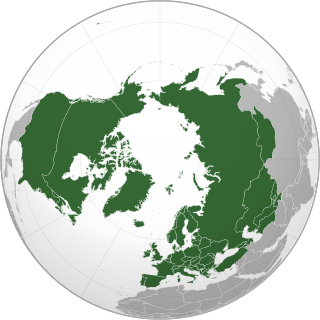
The Organization for Security and Co-operation in Europe (OSCE) is the world's largest security-oriented intergovernmental organization. Its mandate includes issues such as arms control, promotion of human rights, freedom of the press, and fair elections. It employs around 3,460 people, mostly in its field operations but also in its secretariat in Vienna, Austria and its institutions. It has its origins in the 1975 Conference on Security and Co-operation in Europe (CSCE) held in Helsinki, Finland.
Albania is a unitary parliamentary constitutional republic, where the President of Albania is the head of state and the Prime Minister of Albania the head of government in a multi-party system. The executive power is exercised by the Government and the Prime Minister with its Cabinet. Legislative power is vested in the Parliament of Albania. The judiciary is independent of the executive and the legislature. The political system of Albania is laid out in the 1998 constitution. The Parliament adopted the current constitution on 28 November 1998. Due to political instability, the country has had many constitutions during its history. Albania was initially constituted as a monarchy in 1913, briefly a republic in 1925, then it returned to a democratic monarchy in 1928. It later became a socialist republic until the restoration of capitalism and democracy in 1992.
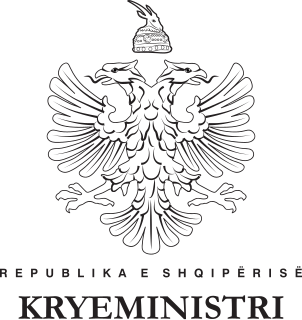
The Prime Minister of Albania, officially styled the Prime Minister of the Republic of Albania, is the head of government of the Republic of Albania and as well the most powerful and influential person in Albanian politics. The Prime Minister holds the executive power of the nation and represents the Council of Ministers and chairs its meetings.

The President of Albania, officially styled the President of the Republic of Albania, is the head of state, commander-in-chief of the military and the representative of the unity of the Albanian people.

Kosovo Polje or Fushë Kosova is a town and municipality located in the Pristina district in central of Kosovo. According to the 2011 census, the town of Kosovo Polje has 12,919 inhabitants, while the municipality has 33,977 inhabitants.
Regular elections in Albania are mandated by the Constitution and legislation enacted by Parliament. The Parliament (Kuvendi) has 140 members elected for four-year terms. The electoral system is closed list proportional representation. There are 12 multi-member constituencies corresponding to the country's 12 administrative regions. Within any constituency, parties must meet a threshold of 3 percent of votes, and pre-election coalitions must meet a threshold of 5 percent of votes.
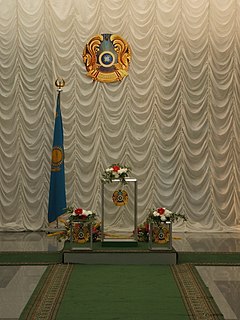
Elections in Kazakhstan are held on a national level to elect a President and the Parliament, which is divided into two bodies, the Majilis and the Senate. Local elections for maslikhats are held every five years.
Parliamentary elections to the Assembly of Kosovo have been held four times since 1999 with the latest in December 2010. The Assembly was an institution within the Provisional Institutions of Self-Government (PISG) established by the United Nations Interim Administration Mission in Kosovo (UNMIK) to provide 'provisional, democratic self-government' in advance of a decision on the final status of Kosovo. Kosovo, formerly a province of Serbia, came under UN administration in 1999 and unilaterally declared its independence in February 2008. The Assembly elected in 2007 continued in office after the declaration of independence.

A municipality is the basic administrative division in Kosovo and constitutes the only level of power in local governance. There are 38 municipalities in Kosovo; 27 of which have Albanian majority, 10–Serb and 1–Turkish (Mamuša). After the 2013 Brussels Agreement between the governments of Kosovo and Serbia, agreement was made to create a Community of Serb Municipalities, which will operate within the Kosovo legal framework. Since 2013, Brussels Agreement has not been fulfilled by Kosovo's authorities calling upon Constitution of Kosovo and territorial integrity of Kosovo, which Serbia does not recognize as sovereign country, but autonomous region according to Constitution of Serbia.

The Parliament of Albania or Kuvendi is the unicameral representative body of the citizens of the Republic of Albania; it is Albania's legislature. The Parliament is composed of not less than 140 members elected to a four-year term on the basis of direct, universal, periodic and equal suffrage by secret ballot. The Parliament is presided over by a Speaker of the Parliament, who is assisted by at least one deputy speaker. The electoral system is based on party-list proportional representation. There are 12 multi-seat constituencies, corresponding to the country's administrative divisions.
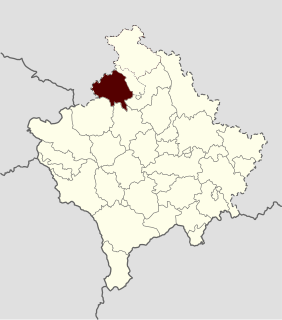
Zubin Potok is a town and municipality located in the Mitrovica District in Kosovo. As of 2015, it has an estimated population of 15,200 inhabitants. It covers an area of 335 km2 (129 sq mi), and consists of town and 63 villages.
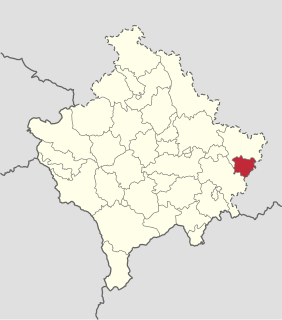
Ranilug or Ranillug, is a village and municipality located in the Gjilan District of Kosovo. The municipality comprises 12 villages and as of 2015 has a population of 5,800 inhabitants.

North Mitrovica or North Kosovska Mitrovica, is a town and municipality located in Mitrovica District in Kosovo. As of 2015, it has a population of 29,460 inhabitants. It covers an area of 11 km2 (4 sq mi).

United Nations Security Council resolution 1114, adopted on 19 June 1997, after recalling Resolution 1101 (1997) on the situation in Albania, the Council authorised an extension to the multinational force in the country for a further 45 days, beginning on 28 June 1997.
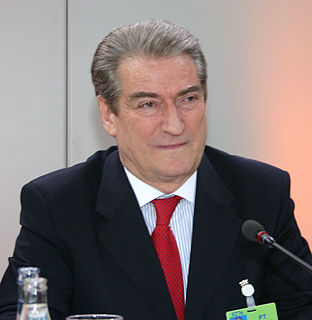
The Albanian local elections of 2011 took place on 8 May 2011 in Albania. Electors were asked to elect their municipality's mayor, municipal council members, municipal unit mayor, and municipal unit members. The elections were administrated by the Central Election Commission of Albania. Only 9 of the 384 winning candidates were women.

Shjiak TV is a channel in Albania. It broadcasts from Shijak, Durrës County, and it supports openly the right winged parties in Albania.
The Albanian local elections in 2000 were the third local elections held in Albania. The elections were held on 1 October 2000.
The Norwegian Helsinki Committee is a Non-Governmental Organization founded in 1977, working to ensure that human rights are respected in practice. Until it was closed down in 2008, the Norwegian Helsinki Committee was affiliated with the International Helsinki Federation for Human Rights, which was a self-governing group of 44 national Helsinki Committees and associated organizations in Europe, Central Asia and North America. It is based in Oslo, Norway.

Local elections were held in Kosovo on 3 November 2013. These were the first elections which the Serbs of Northern Kosovo participated in since the Republic of Kosovo declared independence in 2008; polls were monitored by the OSCE. There were violent reactions in Serb-majority areas of northern Kosovo.
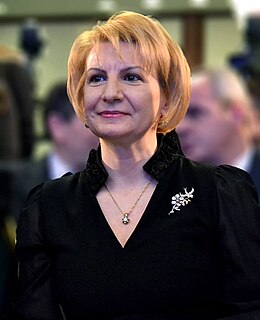
Teuta Arifi is a Macedonian politician of Albanian origin. In April 2013 Teuta Arifi was elected the Mayor of Municipality of Tetovo. Previous to her run for local elections, Teuta Arifi served as Deputy Prime Minister of the Government of the Republic of Macedonia in charge of European Affairs. Arifi was the first Albanian woman to be elected in the Assembly of the Republic of Macedonia in 2002. She was subsequently re-elected as Member of Parliament in 2006, 2008, and 2011. She also holds the position of Vice-President of the Democratic Union for Integration (DUI), key political party of the Albanians in Macedonia Education:. She speaks Albanian, Macedonian, English, French, Italian and Turkish.















